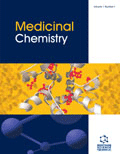
Medicinal Chemistry
Scope & Guideline
Pioneering research that shapes the future of pharmacology.
Introduction
Aims and Scopes
- Drug Design and Synthesis:
The journal emphasizes the design and synthesis of new chemical entities with potential therapeutic applications, employing advanced synthetic methodologies and innovative chemical strategies. - Structure-Activity Relationships (SAR):
Research often includes detailed studies on the structure-activity relationships of compounds, aiming to optimize their pharmacological properties and efficacy. - Biological Evaluation:
Papers frequently report on the biological evaluation of newly synthesized compounds, including in vitro and in vivo studies, to assess their therapeutic potential against various diseases. - Target Identification and Mechanism of Action:
The journal covers studies that identify biological targets for new drugs and elucidate their mechanisms of action, contributing to a deeper understanding of drug efficacy. - Natural Products and Derivatives:
There is a notable interest in the modification and evaluation of natural products, exploring their potential as leads for new drug development. - Interdisciplinary Approaches:
The journal promotes interdisciplinary research that combines medicinal chemistry with molecular biology, pharmacology, and computational modeling to enhance drug discovery efforts.
Trending and Emerging
- PROTACs and Targeted Protein Degradation:
There is a growing interest in the development of PROTACs (proteolysis-targeting chimeras) as a novel strategy for targeted protein degradation, which has become a significant focus in cancer therapeutics. - Nanotechnology in Drug Delivery:
Emerging research highlights the application of nanotechnology for targeted drug delivery systems, enhancing the efficacy and reducing the side effects of therapeutic agents. - Biologics and Bioconjugates:
The rise of biologics, including monoclonal antibodies and their conjugates, is evident, with research increasingly focusing on their design, synthesis, and therapeutic applications. - Antiviral Drug Development:
In light of recent global health challenges, there has been a marked increase in research aimed at developing antiviral agents, particularly against emerging viruses like SARS-CoV-2. - Artificial Intelligence in Drug Discovery:
The integration of artificial intelligence and machine learning in drug design and discovery processes is becoming a prominent theme, facilitating faster and more efficient identification of potential drug candidates. - Focus on Multi-Target Agents:
There is an emerging trend towards the design of multi-target agents that can simultaneously address multiple pathways or mechanisms, reflecting a shift in the approach to complex diseases.
Declining or Waning
- Traditional Small Molecule Inhibitors:
Research focusing solely on traditional small molecule inhibitors without novel modifications or innovative delivery systems seems to be less common, as the field shifts towards more complex and multifunctional agents. - Single Target Drug Development:
There is a noticeable decrease in studies centered around single-target drug development, as the trend moves towards multitargeted approaches and polypharmacology to address complex diseases. - Basic Pharmacokinetic Studies:
Papers that solely focus on basic pharmacokinetic studies without integrating them into broader drug design or therapeutic efficacy are becoming less common, signaling a shift towards more comprehensive evaluations. - Conventional Synthetic Methodologies:
The reliance on conventional synthetic methods without exploration of green chemistry or novel synthetic strategies appears to be waning, as there is increasing emphasis on sustainability and efficiency in drug synthesis.
Similar Journals
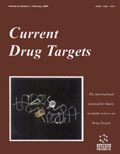
CURRENT DRUG TARGETS
Advancing the Frontiers of Pharmacological ResearchCURRENT DRUG TARGETS is a leading peer-reviewed journal dedicated to advancements in the fields of Clinical Biochemistry, Drug Discovery, Molecular Medicine, and Pharmacology. Published by Bentham Science Publishers Ltd, this esteemed journal has solidified its position in the academic community with a 2023 Q2 ranking in several categories, highlighting its influence and relevance in drug research and development. With an ISSN of 1389-4501 and E-ISSN 1873-5592, CURRENT DRUG TARGETS facilitates the dissemination of high-quality articles that explore novel therapeutic strategies and drug design principles. Catered to researchers, professionals, and students, the journal has a commitment to advancing knowledge while addressing contemporary challenges in pharmacological sciences. As it converges from 2000 to 2024, CURRENT DRUG TARGETS remains a vital resource in understanding the complexities of drug action and interaction, making it indispensable for anyone pursuing cutting-edge research in related disciplines.

Pakistan Journal of Pharmaceutical Sciences
Exploring the forefront of pharmaceutical sciences since 1995.Pakistan Journal of Pharmaceutical Sciences, published by the University of Karachi, serves as a vital platform for advancing research in the field of pharmaceutical sciences. With a strong commitment to disseminating innovative findings and critical studies since its inception in 1995, the journal focuses on a wide array of topics including pharmacology, toxicology, and pharmaceutics. With an ISSN of 1011-601X, it holds a reputable position within the academic community, reflecting its Q3 category ranking in Pharmaceutical Science as of 2023. While the journal is currently not designated as Open Access, it remains accessible through institutional subscriptions, ensuring that both emerging and established researchers can contribute to and benefit from its scholarly content. This publication not only promotes scientific dialogue but also aims to bridge the gap between academia and industry, appealing to a diverse audience of researchers, professionals, and students seeking to stay informed about the latest advancements and trends in pharmaceutical research.
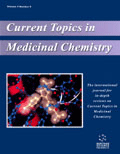
CURRENT TOPICS IN MEDICINAL CHEMISTRY
Pioneering Research for Tomorrow's MedicinesCURRENT TOPICS IN MEDICINAL CHEMISTRY is a prestigious journal published by Bentham Science Publishers Ltd, dedicated to advancing the field of medicinal chemistry through the dissemination of high-quality research from 2001 to 2024. With an ISSN of 1568-0266 and an E-ISSN of 1873-4294, this journal is recognized for its significant contributions, as evidenced by its Scopus ranking in the 63rd percentile in the category of Drug Discovery, specifically at position #58 out of 157. Currently placed in Quartile 3 within Drug Discovery and Quartile 2 in miscellaneous medicine as of 2023, it serves as an essential resource for researchers, professionals, and students interested in the latest developments, methodologies, and applications in medicinal chemistry. The journal aims to foster collaboration and innovation by featuring original research articles, reviews, and brief communications that address current and emerging challenges in the discipline. Although it is not an open access platform, the journal's rich content is indispensable for those striving to enhance therapeutic strategies and drug development processes.
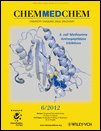
ChemMedChem
Innovating drug discovery through interdisciplinary collaboration.ChemMedChem is a leading international journal published by WILEY-V C H VERLAG GMBH in the United Kingdom, specializing in the interdisciplinary fields of medicinal chemistry and drug discovery. With a commendable impact factor that places it in the Q1 quartile for Organic Chemistry and among the Q2 ranks in several other key categories including Biochemistry, Molecular Medicine, and Pharmacology, ChemMedChem serves as a vital platform for the dissemination of innovative research and transformative insights in the development of pharmaceutical agents. Since its inception in 2006, this journal has been at the forefront of advancing knowledge that bridges the gap between fundamental research and practical applications in medicine, making it an essential resource for researchers, professionals, and students alike. Although it currently does not offer Open Access options, the journal ensures high-quality peer-reviewed content that engages its audience and fosters collaborative scientific discourse.
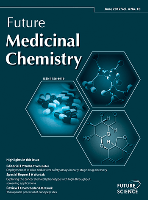
Future Medicinal Chemistry
Connecting researchers to the future of medicine.Future Medicinal Chemistry is a premier journal dedicated to the rapidly evolving fields of drug discovery, pharmacology, and molecular medicine. Published by Newlands Press Ltd in the United Kingdom, this journal has garnered significant attention within the academic community, evidenced by its 2023 category rankings in Scopus, placing it in the Q2 quartile for Drug Discovery and the Q3 quartiles for both Molecular Medicine and Pharmacology. With an ISSN of 1756-8919 and an E-ISSN of 1756-8927, Future Medicinal Chemistry has been a cornerstone of scholarly discourse since its inception in 2009, continuously contributing to the advancement of knowledge and discussion in medicinal chemistry. The journal is committed to publishing high-quality, peer-reviewed research that addresses the challenges and innovations in drug development and therapeutic strategies, making it an essential resource for researchers, professionals, and students seeking to stay at the forefront of these critical fields. Engage with the latest findings and methodologies that shape the future of medicine by exploring the wealth of information offered within Future Medicinal Chemistry.

RUSSIAN JOURNAL OF BIOORGANIC CHEMISTRY
Bridging Theory and Practice in Bioorganic ScienceRussian Journal of Bioorganic Chemistry (ISSN: 1068-1620, E-ISSN: 1608-330X), published by MAIK Nauka/Interperiodica/Springer, serves as a vital resource for researchers and professionals in the fields of bioorganic chemistry, biochemistry, and organic chemistry. With a focus on the integration of organic chemistry principles with biological processes, this journal aims to disseminate significant findings and advancements from both theoretical and practical perspectives. Although currently not open access, the journal retains a dedication to high-quality, peer-reviewed content, contributing to its reputation within the academic community. The 2023 Scopus rankings position it within the Q4 category for both biochemistry and organic chemistry, indicating its critical niche within these disciplines amid a competitive landscape. Since its inception in 1996, the journal has continued to evolve, providing enriching insights and fostering collaborations among scholars and practitioners alike, with publication converging up to the year 2024. By exploring complex biomolecular interactions and the synthesis of biologically relevant compounds, the Russian Journal of Bioorganic Chemistry remains a significant platform for advancing knowledge and innovation in the life sciences.
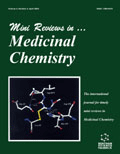
MINI-REVIEWS IN MEDICINAL CHEMISTRY
Exploring Innovations in Medicinal Chemistry.MINI-REVIEWS IN MEDICINAL CHEMISTRY is a distinguished journal published by Bentham Science Publishers, dedicated to the cutting-edge field of medicinal chemistry. With an ISSN of 1389-5575 and an E-ISSN of 1875-5607, this journal serves as an essential platform for researchers and professionals to disseminate concise yet comprehensive reviews that capture the latest advancements and trends in drug discovery, cancer research, pharmacology, and molecular medicine. Operating since 2001, it has consistently maintained a relevant presence in academia with its impressive rank metrics, including a Q2 category in Drug Discovery and Pharmacology in 2023, highlighting its significance in the scientific community. The journal is recognized for its rigorous peer-review process and provides an invaluable resource for students and researchers seeking insights into the rapidly evolving landscape of medicinal chemistry. With a commitment to excellence and innovation, MINI-REVIEWS IN MEDICINAL CHEMISTRY continues to foster knowledge exchange and inspire future breakthroughs in healthcare and therapeutic advancements.
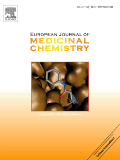
EUROPEAN JOURNAL OF MEDICINAL CHEMISTRY
Innovating Drug Development Through Cutting-Edge Research.European Journal of Medicinal Chemistry, a premier publication by Elsevier France-Editions Scientifiques Médicales Elsevier, has been at the forefront of advancing medicinal chemistry since its inception in 1974. With an impressive impact factor and ranking in the Q1 quartile across multiple categories including Drug Discovery, Medicine (miscellaneous), Organic Chemistry, and Pharmacology, this journal delivers cutting-edge research and reviews that are vital for researchers and professionals in the field. The journal’s scope encompasses the design, synthesis, and evaluation of biological activity of bioactive compounds, making it a critical resource for those looking to innovate in drug development and therapeutic strategies. Although currently not open access, subscribers can benefit from its diverse range of high-quality articles, ensuring the dissemination of knowledge in the ever-evolving landscape of medicinal chemistry. The European Journal of Medicinal Chemistry continues to play a pivotal role in shaping the future of pharmacological research and its application, thus appealing to an audience dedicated to making impactful scientific contributions.

RSC Medicinal Chemistry
Empowering Global Collaboration in Medicinal ChemistryRSC Medicinal Chemistry is a pivotal journal in the realm of medicinal chemistry, published by the esteemed Royal Society of Chemistry. With a focus on innovative research that intersects various disciplines such as biochemistry, drug discovery, pharmaceutical science, and organic chemistry, this journal serves as a vital resource for researchers, professionals, and students alike. Its impressive impact factor and notable rankings—positioning it within the Q1 and Q2 quartiles across critical categories—underscore its significance in advancing knowledge and fostering collaboration within the scientific community. RSC Medicinal Chemistry is dedicated to open access, ensuring that cutting-edge findings on drug design and therapeutic applications are freely available to enhance global research efforts. With a commitment to publication excellence from 2020 to 2024, it is a prominent platform where groundbreaking ideas meet practical implications, making it indispensable for anyone committed to the forefront of medicinal advances.
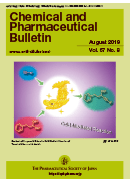
CHEMICAL & PHARMACEUTICAL BULLETIN
Advancing knowledge in chemistry and pharmaceuticals since 1958.CHEMICAL & PHARMACEUTICAL BULLETIN, published by the Pharmaceutical Society of Japan, has been a cornerstone in the fields of chemistry, drug discovery, and medicine since its inception in 1958. With an ISSN of 0009-2363, this esteemed journal offers a platform for the dissemination of innovative research and critical insights contributing to these dynamic disciplines. Housed in Tokyo, Japan, it is strategically poised to bridge the gap between chemical sciences and pharmaceutical applications. Although the journal operates under a traditional subscription model and does not currently offer open access, it maintains a solid reputation, evidenced by its Q3 category rankings in multiple relevant fields and its percentile positions in Scopus, specifically 48th in General Chemistry and 30th in Drug Discovery. Researchers, professionals, and students alike will find invaluable resources within its pages, as it diligently covers shifting paradigms and emerging methodologies critical to advancing both theoretical understanding and practical applications in the pharmaceutical realm.